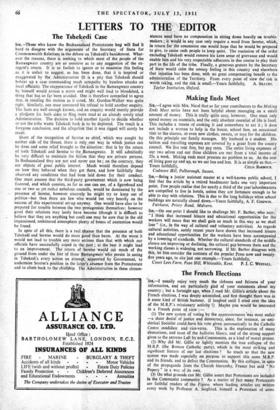TO THE' EDITOR LETTERS
The Tshekedi Case
Sic —Those who know the Bechuanaland Protectorate beri will find it hard to disagree with the arguments of the Secretary of State for Commonwealth Relations in the debate on Tshekedi's banishment. What- ever the reasons, there is nothing to which most of the people of the Bamangwato country are so sensitive as to any suggestion of the ex- regent's return. It is as foolish to ignore or to minimise this feeling as it is unfair to suggest, as has been done, that it is inspired or exaggerated by the. Administration (it is a pity that Tshekedi should bolster up a case commanding much sympathy by baseless attacks on local officials). The reappearance of Tshekedi in the Bamangwato country by himself would arouse a storm and might well lead to bloodshed, a thing that has so far been avoided. One is therefore compelled to agree that, in resisting the motion as it stood, Mr. Gordon-Walker was quite right. Similarly, one must commend his refusal to hold another enquiry. The facts are well enough known, and an enquiry would merely provide a platform for both sides to fling more mud at an already sorely tried Administration. The decision to hold another kgotla to decide whether or not the tribe wants Tshekedi back is to be deplored. The result Is a foregone conclusion, and the allegation that it was rigged will surely be made.
Short of the recognition of Seretse as chief, which was sought by neither side of the House, there is only one way in which justice can be done and some relief brought to the situation: that is by the return of both Tshekedi and Seretse to the .Bamangwato. It will admittedly be very difficult to maintain the fiction that they are private persons. In Bechuanaland they are not and never can be ; on the contrary, they are objects of great public interest. Much would therefore depend on how they behaved when they got there, and how faithfully they observed any conditions that had been laid down for their conduct. One must assume that the third-party government which is now being fostered, and which consists, as far as one can see, of a figurehead and one or two as yet rather nebulous councils, would be dominated by the presence of Seretse, however sincerely he might try to keep out of politics—but then there are few who would bet very heavily on the success of this experimental set-up anyway. One would have also to be prepared for trouble between the two -protagonists themselves: however good their relations may lately have become (though it is difficult to believe that they are anything but cool) one may be sure that in the old impassioned, embittered atmosphere plenty of bones of contention would be found.
In spite of all this, there is a real chance that the presence of both Tshekedi and Seretse would do more good than harm. At the worst it would not lead to trouble any more serious than that with which our officials have successfully coped in the past ; at the best it might lead to an improvement. The return of Seretse would cut much of the ground from under the feet of those Bamangwato'who persist in seeing in Tshekedi's every action an attempt, supported by Government, to undermine Seretse's position in the latter's absence from the Protectorate and to climb back to the chiefship. The Administration in these circum- stances need have no compunction in sitting down heavily on trouble- makers ; it would in any case only require a word from Seretse, which, in return for the concession one would hope that he would be prepared to give, to cause such people to keep quiet. The rescission of the order excluding-Tshekedi would remove his keen sense of grievance and would enable him and his very respectable adherents in due course to play their part in the life of the tribe. Finally, a generous gesture by the Secretary of State would calm the uneasy feeling in this country and elsewhere that injustice has been done, with no great compensating benefit to the administration of the Territory. From every point of view the risk is
worth taking, and the risk is small—Yours faithfully, A. SILLERY. Taylor Institution, Oxford.






































 Previous page
Previous page